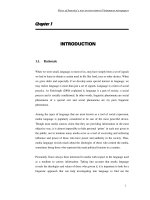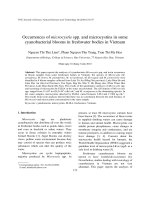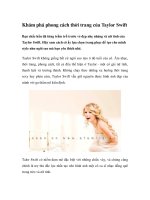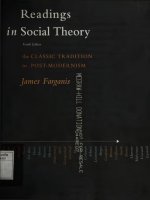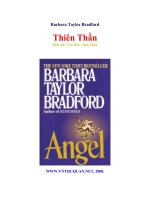Samuel taylor coleridge, blooms classic critical views
Bạn đang xem bản rút gọn của tài liệu. Xem và tải ngay bản đầy đủ của tài liệu tại đây (0 B, 311 trang )
Bloom’s Classic Critical Views
S A M U E L TAY L O R
COLERIDGE
Bloom's Classic Critical Views
Alfred, Lord Tennyson
Benjamin Franklin
The Brontës
Charles Dickens
Edgar Allan Poe
Geoffrey Chaucer
George Eliot
George Gordon, Lord Byron
Henry David Thoreau
Herman Melville
Jane Austen
John Donne and the Metaphysical Poets
John Milton
Jonathan Swift
Mark Twain
Mary Shelley
Nathaniel Hawthorne
Oscar Wilde
Percy Shelley
Ralph Waldo Emerson
Robert Browning
Samuel Taylor Coleridge
Stephen Crane
Walt Whitman
William Blake
William Shakespeare
William Wordsworth
Bloom’s Classic Critical Views
S A M U E L TAY L O R
COLERIDGE
Edited and with an Introduction by
Harold Bloom
Sterling Professor of the Humanities
Yale University
Bloom’s Classic Critical Views: Samuel Taylor Coleridge
Copyright © 2009 Infobase Publishing
Introduction © 2009 by Harold Bloom
All rights reserved. No part of this publication may be reproduced or utilized in any form
or by any means, electronic or mechanical, including photocopying, recording, or by any
information storage or retrieval systems, without permission in writing from the publisher.
For more information contact:
Bloom’s Literary Criticism
An imprint of Infobase Publishing
132 West 31st Street
New York NY 10001
Library of Congress Cataloging-in-Publication Data
Samuel Taylor Coleridge / edited and with an introduction by Harold Bloom; Janyce
Marson, volume editor.
p. cm. — (Bloom’s classic critical views)
Includes bibliographical references and index.
ISBN 978-1-60413-428-5 (acid-free paper)
ISBN 978-1-4381-2763-7 (e-book)
1. Coleridge, Samuel Taylor, 1772–1834—Criticism and interpretation. I. Bloom,
Harold. II. Marson, Janyce. III. Title. IV. Series.
PR4484.S26 2009
821'.7—dc22
2009012453
Bloom’s Literary Criticism books are available at special discounts when purchased in
bulk quantities for businesses, associations, institutions, or sales promotions. Please call
our Special Sales Department in New York at (212) 967-8800 or (800) 322-8755.
You can find Bloom’s Literary Criticism on the World Wide Web at
Volume editor: Janyce Marson
Series design by Erika K. Arroyo
Cover designed by Takeshi Takahashi
Printed in the United States of America
IBT IBT 10 9 8 7 6 5 4 3 2 1
This book is printed on acid-free paper.
All links and Web addresses were checked and verified to be correct at the time
of publication. Because of the dynamic nature of the Web, some addresses and links
may have changed since publication and may no longer be valid.
Contents
QQQ
Series Introduction
ix
Introduction by Harold Bloom
xi
Biography
xiii
Personal
Samuel Taylor Coleridge (1797)
Dorothy Wordsworth (1801)
William Wordsworth (1805)
George Gordon, Lord Byron (1811)
John Gibson Lockhart (1819)
William Hazlitt (1823)
Samuel Taylor Coleridge (1833)
Sara Coleridge (1834)
Charles Lamb (1834)
Thomas De Quincey (1834–35)
Caroline Fox (1836)
Joseph Cottle (1837)
Thomas Hood (1845)
Leigh Hunt (1850)
Thomas Carlyle (1851)
3
5
7
8
8
8
9
10
10
15
17
18
18
20
22
26
General
George Gordon, Lord Byron (1809)
John Wilson “Observations on Coleridge’s
Biographia Literaria” (1817)
William Hazlitt (1818)
George Gordon, Lord Byron “Dedication’’ (1819)
Percy Bysshe Shelley (1819)
Percy Bysshe Shelley (1820)
29
31
31
34
36
37
38
vi
Contents
John Sterling “Coleridge” (1839)
Elizabeth Barrett Browning (1844)
Leigh Hunt (1844)
Margaret Fuller “Modern British Poets” (1846)
George Meredith (1851)
Ralph Waldo Emerson “Literature” (1856)
Matthew Arnold “Joubert” (1864)
Dante Gabriel Rossetti “Samuel Taylor Coleridge” (1880–81)
W.P. Ker “Samuel Taylor Coleridge” (1896)
Francis Thompson “Academy Portraits: XIII.
S.T. Coleridge” (1897)
George Brandes “Naturalistic Romanticism” (1905)
Lane Cooper “The Abyssinian Paradise in Coleridge
and Milton” (1906)
W.J. Dawson “Coleridge” (1906)
Lane Cooper “The ‘Forest Hermit’ in Coleridge
and Wordsworth” (1909)
B.H. Lehman “The Doctrine of Leadership in the
Greater Romantic Poets” (1922)
38
40
40
43
45
45
46
46
47
51
57
68
73
79
87
WORKS
Lyrical Ballads
James Dykes Campbell “Nether Stowey—
Lyrical Ballads” (1896)
Charles Wharton Stork “The Influence of the
Popular Ballad on Wordsworth and Coleridge” (1914)
99
99
119
The Rime of the Ancient Mariner
Thomas B. Shaw (1847)
Peter Bayne “Coleridge” (1858)
Gertrude Garrigues “Coleridge’s Ancient Mariner” (1880)
Hall Caine (1883)
H.D. Traill “Coleridge” (1884)
William Watson “Coleridge’s Supernaturalism” (1893)
Richard Garnett “The ‘Ancient Mariner’ as an Exemplar
of Coleridge’s Genius” (1904)
A.W. Crawford “On Coleridge’s Ancient Mariner” (1919)
140
140
141
168
180
181
189
“Kubla Khan”
Thomas Love Peacock (1818)
George H. Calvert (1880)
208
208
209
Christabel
George Gordon, Lord Byron (1816)
212
212
193
206
vii
Contents
John Gibson Lockhart “On the Lake School of Poetry:
III. Coleridge” (1819)
John Sterling “On Coleridge’s Christabel” (1828)
Edgar Allan Poe “The Rationale of Verse” (1848)
William Watson “Lines in a Flyleaf of Christabel” (1893)
212
214
215
216
Critical Writings
William Hazlitt (1825)
Charles Knight (1849)
George Gilfillan “Jeffrey and Coleridge” (1854)
Walter Pater “Coleridge” (1865)
Algernon Charles Swinburne “Coleridge” (1869)
James Russell Lowell “Coleridge” (1885)
Laura Johnson Wylie (1894)
Alice D. Snyder “A Note on Coleridge’s
Shakespeare Criticism” (1923)
216
216
227
228
229
244
254
260
Biographia Literaria
George Watson “Introduction” (1906)
270
270
Chronology
283
Index
287
261
Series Introduction
QQQ
Bloom’s Classic Critical Views is a new series presenting a selection of the most
important older literary criticism on the greatest authors commonly read in high
school and college classes today. Unlike the Bloom’s Modern Critical Views series,
which for more than 20 years has provided the best contemporary criticism on great
authors, Bloom’s Classic Critical Views attempts to present the authors in the context of their time and to provide criticism that has proved over the years to be the
most valuable to readers and writers. Selections range from contemporary reviews
in popular magazines, which demonstrate how a work was received in its own era,
to profound essays by some of the strongest critics in the British and American tradition, including Henry James, G.K. Chesterton, Matthew Arnold, and many more.
Some of the critical essays and extracts presented here have appeared previously
in other titles edited by Harold Bloom, such as the New Moulton’s Library of Literary
Criticism. Other selections appear here for the first time in any book by this publisher.
All were selected under Harold Bloom’s guidance.
In addition, each volume in this series contains a series of essays by a contemporary expert, who comments on the most important critical selections, putting
them in context and suggesting how they might be used by a student writer to
influence his or her own writing. This series is intended above all for students, to
help them think more deeply and write more powerfully about great writers and
their works.
ix
Introduction by Harold Bloom
QQQ
Coleridge was a great, fragmentary poet and the major theoretician of the English
romantic imagination. As a person he was volatile, dependent, addictive: a brilliant
ruin. As a conversationalist he surpassed his era, except for Lord Byron. As a poet he
could not achieve epic, in any of the romantic period’s longer masterpieces: William
Blake’s The Four Zoas, Milton, and Jerusalem; William Wordsworth’s The Prelude;
Byron’s Don Juan; Shelley’s Prometheus Unbound and the unfinished masterwork,
The Triumph of Life; Keats’s two Hyperion fragments. And yet he achieved perfection
in The Rime of the Ancient Mariner and the fragments Christabel and “Kubla Khan.”
Add “Dejection: An Ode,” and you have four indispensable major poems, with “Frost
at Midnight” perhaps adding a fifth.
Coleridge could and should have accomplished much more as a poet. He deferred
to the greater psychic strength of his best friend Wordsworth, but that is only part
of his inhibiting anxiety. Increasingly a moral critic, he began to censor his own
visions, and so yielded to the drabness of things as they are. The poet Swinburne, a
remarkable literary critic, saw Coleridge most clearly: “Coleridge was the reverse of
Antaeus, the contact of earth took all strength out of him.” There is a more positive
aspect to that truth: Coleridge made contact with sea, fire, and air, and from that he
kindled a poetic art unlike any other, except Shakespeare’s. The cosmos of natural
magic in A Midsummer Night’s Dream and The Tempest revives in Coleridge’s handful
of extraordinary poems.
As a literary critic, metaphysical thinker, and lay theologian, Coleridge’s powers
were extraordinary but never fully shaped into an incontrovertible form. Biographia
Literaria and Aids to Reflection are disjointed works, brilliant and surpassingly valuable
only in scattered places. I find them less satisfactory than the massive Notebooks,
splendidly edited by Kathleen Coburn. Essentially Coleridge was an aphorist, most
illuminating in single sentences and lucid paragraphs.
xi
xii
Introduction
In his criticism, Coleridge is best on Wordsworth and on certain aspects of
Shakespeare. Wordsworth prompted Coleridge to the marvelous realization that
the function of romantic poetry is to manifest the power of the poet’s mind over “a
universe of death,” Milton’s phrase for the Chaos and Old Night through which Satan
heroically voyages on his way to the New World of Eden in Paradise Lost.
Coleridge’s formulation seems to me crucial for understanding modern poetry
from Wordsworth down to the present moment. In Walt Whitman’s Song of Myself,
T.S. Eliot’s The Waste Land, Wallace Stevens’s The Auroras of Autumn, and Hart Crane’s
The Bridge, the central anguish always resolves into the question: where does the
poet stand in relation to the four-in-one of Night, Death, the Mother, and the Sea?
Whether critics rebel against Coleridge—Walter Pater and Northrop Frye—or
seek to build on him—I.A. Richards and Kenneth Burke—he remains indispensable to
their enterprise. As poet-critic, Coleridge always will be read and employed, because
of what Shelley termed “the exceeding lustre and the pure / Intense irradiation of a
mind.”
t
BIOGRAPHY
t
Samuel Taylor Coleridge
(–)
t
Samuel Taylor Coleridge was born October 21, 1772, in Ottery St. Mary, Devonshire,
where his father was vicar. In 1782, after his father’s early death, he was admitted to
the Christ’s Hospital school, where his circle included Leigh Hunt and Charles Lamb.
In 1791, Coleridge went on to Jesus College at Cambridge to prepare for the ministry
but left school in 1793 to enlist in the 15th Light Dragoons. In 1794, he obtained a
discharge and returned to Cambridge, but before the year was over he found himself more interested in radical politics than in religion and left school permanently
without taking a degree.
Coleridge’s first published poems, a series of sonnets to famous radicals
including William Godwin and Joseph Priestley, appeared in the Morning Chronicle
in 1794–95. He then published a verse drama, The Fall of Robespierre (1794), written
in collaboration with his friend Robert Southey. He and Southey jointly conceived a
philosophical scheme they named Pantisocracy and planned to establish a commune
on the Susquehanna River in the United States. Coleridge married Sara Fricker in
1795, and in 1796 their first son, Hartley, was born. Poems on Various Subjects, which
included “Monody on the Death of Chatterton” and “The Eolian Harp,” appeared in
1796, and between March and May of that year Coleridge also published his own
liberal periodical, The Watchman. Between 1797 and 1798, he composed a series of
poems addressed to Wordsworth and his sister, Dorothy, with whom he had formed
a close friendship since their initial meeting in 1797. During this period he also wrote
“Kubla Khan: A Vision in a Dream” and The Rime of the Ancient Mariner and started
three other ballads, including Christabel.
In response to the French invasion of Switzerland, in 1798 Coleridge published
“France: An Ode,” which marked the beginning of his disillusionment with the
course of the French revolutionary movement. Shortly after, while traveling in
Germany, Wordsworth and Coleridge anonymously published Lyrical Ballads (1798),
1
2
Biography
a selection of their work that included four poems by Coleridge. In 1799, Coleridge
entered the University of Göttingen, where he studied the works of Kant, Schelling,
and Schiller. After returning to London later that year, he published a translation
of Schiller’s Wallenstein. It was also shortly after returning from Germany that
Coleridge first met Sara Hutchinson, Wordsworth’s future sister-in-law, with whom
he fell in love, an episode reflected in his poems “Love” (1799), “To Asra” (1801),
and “Love’s Sanctuary” (c. 1801). Coleridge’s unhappiness was compounded by
an increasing addiction to opium, and it was in a mood of near despair that he
composed “Dejection: An Ode” in 1802.
In 1804, he traveled alone in an attempt to recover his spirits and health and
served for two years as secretary to the governor of wartime Malta. Afterward, he
journeyed through Sicily and Italy. Coleridge returned to England in 1806 and, after
separating from his wife, began living with the Wordsworths and Sara Hutchinson
in Colerton, Leicestershire. In 1809–10, Coleridge, with the help of Sara Hutchinson,
edited and published The Friend, a political, philosophical, and literary journal,
of which twenty-six issues appeared. By the time the journal ceased publication,
Coleridge had become estranged from both Sara Hutchinson and the Wordsworths,
and for the next several years, after leaving for London in 1811, he experienced
bouts of depression, a condition again worsened by his continuing addiction to
opium. During this time, he continued to lecture publicly, and in 1813 he published
Remorse, a revision of an earlier play, and Osorio, performed that year at the Drury
Lane Theatre.
Between 1810 and 1816, Coleridge lived intermittently with John Morgan and
his family, who did much to sustain him through his illness and depression. During
this period, he began seeking treatment for his opium addiction. In 1816 he began
living at Highgate, the family home of the physician James Gillman, where he was
to remain until his death. Under Gillman’s care, Coleridge’s health began to improve,
and he started publishing more frequently. Christabel and Other Poems, including
“Kubla Khan” and “The Pains of Sleep,” appeared in 1816 and was followed in 1817
by Biographia Literaria, his major critical work; Sibylline Leaves, the first edition of
his revised collected poems (later expanded in 1828 and 1834); and Zapolya, a long
dramatic poem based on Shakespeare’s The Winter’s Tale. These works brought
Coleridge a whole new generation of admirers. His remaining prose works, which
reflect his increasingly orthodox Christianity, include his two lay sermons (1816, 1817),
the Aids to Reflection (1825), and a pamphlet, The Constitution of Church and State
(1828). After Coleridge’s death on July 25, 1834, his Literary Remains, edited by Henry
Nelson Coleridge (4 vols., 1836–38), and Confessions of an Enquiring Spirit (1840) were
published. Other posthumously published volumes include his Notebooks (3 vols.,
1956–73) and Letters (6 vols., 1956–71).
t
PERSONAL
t
t
Samuel Taylor Coleridge ()
In a 1797 letter to Thomas Poole, the young owner of a local tannery known
for his democratic opinions, Coleridge talks about the sibling rivalry with
his brother Francis. Apparently, Coleridge was favored by his parents, who
paid him more attention and gave little gifts to the young Samuel. As a
consequence of this favoritism, Coleridge recollects being mistreated by
their nurse, Molly, an old family retainer. The result of this domestic rivalry
was that it put Coleridge in bad temper, which was then obvious to schoolmates who would in turn torment him. As a retreat from this vicious cycle
of rejection, Coleridge turned to reading, in which he took great pleasure.
With fondness, the poet remembers visiting his aunt’s shop at Crediton
where he read such tales as Tom Hickathrift, Jack the Giant Killer, and all
manner of adventure stories when only six years old. Coleridge was, by all
accounts, a precocious child. He read widely with great interest, exhibiting
true intellect and great imagination. At the same time, his bookish nature
left him indolent, for he did not engage in sports, preferring to spend his
time daydreaming. Both genius and laziness would follow the poet into
old age, causing most critics to admire his imagination while regretting
that he could have done so much more had he been able to organize his
insight and understanding into finished works.
QQQ
From October 1775 to October 1778.—These three years I continued at the
reading-school—because I was too little to be trusted among my Father’s
School-boys—. After breakfast I had a halfpenny given me, with which I
bought three cakes at the Baker’s close by the school of my old mistress—&
these were my dinner on every day except Saturday & Sunday—when I used
to dine at home, and in a beef & pudding dinner.—I am remarkably fond of
6
Samuel Taylor Coleridge
Beans & Bacon—and this fondness I attribute to my father’s having given me
a penny for having eat a large quantity of beans, one Saturday—for the other
boys did not like them, and as it was an economic food, my father thought,
that my attachment & penchant for it ought to be encouraged. My Father
was very fond of me, and I was my mother’s darling—in consequence, I was
very miserable. For Molly, who had nursed my Brother Francis, and was
immoderately fond of him, hated me because my mother took more notice
of me than of Frank—and Frank hated me, because my mother gave me now
& then a bit of cake, when he had none—quite forgetting that for one bit of
cake which I had & he had not, he had twenty sops in the pan & pieces of
bread & butter with sugar on them from Molly, from whom I received only
thumps & ill names.—So I became fretful, & timorous, & a tell-tale—& the
School-boys drove me from play, & were always tormenting me—& hence I
took no pleasure in boyish sports—but read incessantly. My Father’s Sister
kept an every-thing Shop at Crediton—and there I read thro’ all the gilt-cover
little books that could be had at that time, & likewise all the uncovered tales
of Tom Hickathrift, Jack the Giant-killer, &c &c &c &c—and I used to lie by
the wall, and mope—and my spirits used to come upon me suddenly, & in a
flood—& then I was accustomed to run up and down the church-yard, and
act over all I had been reading on the docks, the nettles, and the rank-grass.—
At six years old I remember to have read Belisarius, Robinson Crusoe, &
Philip Quarle—and then I found the Arabian Nights’ entertainments—one
tale of which (the tale of a man who was compelled to seek for a pure virgin)
made so deep an impression on me (I had read it in the evening while my
mother was mending stockings) that I was haunted by spectres, whenever I
was in the dark—and I distinctly remember the anxious & fearful eagerness,
with which I used to watch the window, in which the books lay—& whenever
the Sun lay upon them, I would seize it, carry it by the wall, & bask, & read—.
My Father found out the effect, which these books had produced—and
burnt them.—So I became a dreamer—and acquired an indisposition to
all bodily activity—and I was fretful, and inordinately passionate, and as I
could not play at any thing, and was slothful, I was despised & hated by the
boys; and because I could read & spell, & had, I may truly say, a memory &
understanding forced into almost an unnatural ripeness, I was flattered &
wondered at by all the old women—& so I became very vain, and despised
most of the boys, that were at all near my own age—and before I was eight
years old, I was a character—sensibility, imagination, vanity, sloth, & feelings
of deep & bitter contempt for almost all who traversed the orbit of my
understanding, were even then prominent & manifest. From October 1778
to 1779.—That which I began to be from 3 to 6, I continued from 6 to 9.—In
Personal
7
this year I was admitted into the grammer school, and soon outstripped all
of my age.—I had a dangerous putrid fever this year—My Brother George lay
ill of the same fever in the next room. My poor Brother Francis, I remember,
stole up in spite of orders to the contrary, & sate by my bedside, & read
Pope’s Homer to me—Frank had a violent love of beating me—but whenever
that was superseded by any humour or circumstance, he was always very
fond of me—& used to regard me with a strange mixture of admiration &
contempt—strange it was not—: for he hated books, and loved climbing,
fighting, playing, & robbing orchards, to distraction.—My mother relates a
story of me, which I repeat here—because it must be regarded as my first
piece of wit.—During my fever I asked why Lady Northcote (our neighbour)
did not come & see me.—My mother said, She was afraid of catching the
fever—I was piqued & answered—Ah—Mamma! the four Angels round my
bed an’t afraid of catching it.—I suppose, you know the old prayer—
Matthew! Mark! Luke! & John!
God bless the bed which I lie on.
Four Angels round me spread,
Two at my foot & two at my head—
This prayer I said nightly—& most firmly believed the truth of it.—
Frequently have I, half-awake & half-asleep, my body diseased & fevered by
my imagination, seen armies of ugly Things bursting in upon me, & these
four angels keeping them off.
—Samuel Taylor Coleridge, letter to
Thomas Poole, October 9, 1797
Dorothy Wordsworth ()
Dorothy Wordsworth, the poet’s sister, always bore great affection for
Samuel Coleridge. Her journal entry of November 10, 1801, was written at a
time when Coleridge had become tired of married life and had returned to
London after a fifteen-month interval at Greta Hall, in the lake country in
Keswick, Cumberland. Though Coleridge had hoped to enjoy a promising
domestic life there—along with an appreciative landlord, William Jackson,
who had great respect for his esteemed tenant—the situation at Greta Hall
began to unravel. Coleridge unwittingly managed to get Jackson entangled in financial problems due to the poet’s mismanagement. He had
also grown accustomed to depending on the Wordsworths and longed to
return to their company, though Greta Hall was about fifteen miles away
from where his friends resided. Added to Coleridge’s woes were his opium
8
Samuel Taylor Coleridge
addiction, which no longer served as a source of poetic inspiration, as
well as the knowledge that Wordsworth was busy working on The Prelude,
while he was despairing, static, and unproductive.
QQQ
Poor C. left us, and we came home together. We left Keswick at 2 o’clock and did
not arrive at G(rasmere) till 9 o’clock. . . . C. had a sweet day for his ride. Every
sight and every sound reminded me of him—dear, dear fellow, of his many
walks to us by day and by night, of all dear things. I was melancholy, and could
not talk, but at last I eased my heart by weeping—nervous blubbering, says
William. It is not so. O! how many, many reasons have I to be anxious for him.
—Dorothy Wordsworth, Journal,
November 10, 1801
William Wordsworth ()
With such a theme,
Coleridge! with this my argument, of thee
Shall I be silent? O capacious Soul!
Placed on this earth to love and understand,
And from thy presence shed the light of love,
Shall I be mute, ere thou be spoken of?
Thy kindred influence to my heart of hearts
Did also find its way.
—William Wordsworth, The Prelude,
1805, book 14, pp. 275–282
George Gordon, Lord Byron ()
Coleridge has been lecturing against Campbell, Rogers was present, & from
him I derive the information, we are going to make a party to hear this
Manichean of Poesy.
—George Gordon, Lord Byron, letter to
William Harness, December 8, 1811
John Gibson Lockhart ()
John Gibson Lockhart (1794–1854), a Scottish writer and editor, is best
known for his definitive biography of Sir Walter Scott. In 1817, Lockhart
joined the staff of Blackwood’s Edinburgh Magazine, originally conceived
Personal
9
to provide competition to the Whig-supporting Edinburgh Review. Despite
the magazine’s conservative sympathies, it published the works of the
radical Percy Bysshe Shelley as well as those of Samuel Taylor Coleridge.
In the following excerpt, Lockhart comments on Coleridge’s unattractive
facial features, noting though the profound look in his eyes that so many
others, including Wordsworth, had commented on.
QQQ
Coleridge has a grand head, but very ill balanced, and the features of the face
are coarse—although, to be sure, nothing can surpass the depth of meaning
in his eyes, and the unutterable dreamy luxury in his lips.
—John Gibson Lockhart, Peter’s Letters to
His Kinsfolk, 1819, letter 54
William Hazlitt “My First
Acquaintance with Poets” ()
Hazlitt pays homage to Coleridge, depicting him as a prophet and comparing him to St. John, as he preached on war, church, and state. Hazlitt
praises Coleridge’s ability to render his sermon poetically, reveling in
Coleridge’s aptitude for combining poetry with philosophy, uniting truth
with a pleasing manner of speaking, which instilled in Hazlitt a reason to
believe in the future.
QQQ
It was in January, 1798, that I rose one morning before day-light, to walk
ten miles in the mud, and went to hear this celebrated person preach. Never,
the longest day I have to live, shall I have such another walk as this cold,
raw, comfortless one, in the winter of the year 1798.—Il y a des impressions
que ni le terns ni les circonstances peuvent effacer. Dusse-je vivre des siecles
entiers, le doux terns de ma jeunesse ne peut renaitre pour moi, ni s’effacer
jamais dans ma memoire. When I got there, the organ was playing the 100th
psalm, and, when it was done, Mr. Coleridge rose and gave out his text, “And
he went up into the mountain to pray, himself, alone.” As he gave out this text,
his voice “rose like a steam of rich distilled perfumes,’’ and when he came to
the two last words, which he pronounced loud, deep, and distinct, it seemed
to me, who was then young, as if the sounds had echoed from the bottom of
the human heart, and as if that prayer might have floated in solemn silence
through the universe. The idea of St. John came into my mind, “of one crying
in the wilderness, who had his loins girt about, and whose food was locusts
and wild honey.” The preacher then launched into his subject, like an eagle
10
Samuel Taylor Coleridge
dallying with the wind. The sermon was upon peace and war; upon church
and state—not their alliance, but their separation—on the spirit of the world
and the spirit of Christianity, not as the same, but as opposed to one another.
He talked of those who had “inscribed the cross of Christ on banners dripping
with human gore.” He made a poetical and pastoral excursion,—and to shew
the fatal effects of war, drew a striking contrast between the simple shepherd
boy, driving his team afield, or sitting under the hawthorn, piping to his
flock, “as though he should never be old,” and the same poor country-lad,
crimped, kidnapped, brought into town, made drunk at an alehouse, turned
into a wretched drummer-boy, with his hair sticking on end with powder and
pomatum, a long cue at his back, and tricked out in the loathsome finery of
the profession of blood.
Such were the notes our once-lov’d poet sung.
And for myself, I could not have been more delighted if I had heard the
music of the spheres. Poetry and Philosophy had met together, Truth and
Genius had embraced, under the eye and with the sanction of Religion. This
was even beyond my hopes. I returned home well satisfied. The sun that was
still labouring pale and wan through the sky, obscured by thick mists, seemed
an emblem of the good cause; and the cold dank drops of dew that hung half
melted on the beard of the thistle, had something genial and refreshing in them;
for there was a spirit of hope and youth in all nature, that turned everything
into good. The face of nature had not then the brand of Jus DiviNUM on it:
Like to that sanguine flower inscrib’d with woe.
—William Hazlitt, “My First Acquaintance
with Poets,” Liberal, April 1823
Samuel Taylor Coleridge ()
Stop, Christian passer-by!—Stop, child of God,
And read with gentle breast. Beneath this sod
A poet lies, or that which once seem’d he.
O, lift one thought in prayer for S. T. C;
That he who many a year with toil of breath
Found death in life, may here find life in death!
Mercy for praise—to be forgiven for fame
He ask’d, and hoped, through Christ. Do thou the same!
—Samuel Taylor Coleridge, “Epitaph,” 1833

